Sixteen years after a devastating earthquake killed thousands of schoolchildren in China's southwestern province of Sichuan, bereaved parents say they still have nowhere to publicly commemorate their lost children, and that the government has yet to deliver on promises made in the aftermath of the disaster.
The magnitude 7.9 earthquake that struck on May 12, 2008, left more than 80,000 dead across the province, including more than 5,000 children.
On Sunday, dozens of parents whose children died in disaster due to substandard construction in school buildings -- known as " tofu buildings" -- said they were met with a heavy police presence when they went to lay flowers at the site where their children died at the Juyuan Junior High School in Dujiangyan, one of the worst-hit areas.
More than 100 bereaved parents tried to get through to the site of the former school, but were met by large numbers of uniformed police and plainclothes officers who linked arms to stop them getting through.
Video clips shared with Radio Free Asia showed one individual in plain clothes snatching away offerings of flowers from a woman at the scene. Eventually, police allowed parents to pose for personal photos at the site, but forced them to make their offerings further away on the street, some of the participants told RFA Mandarin.
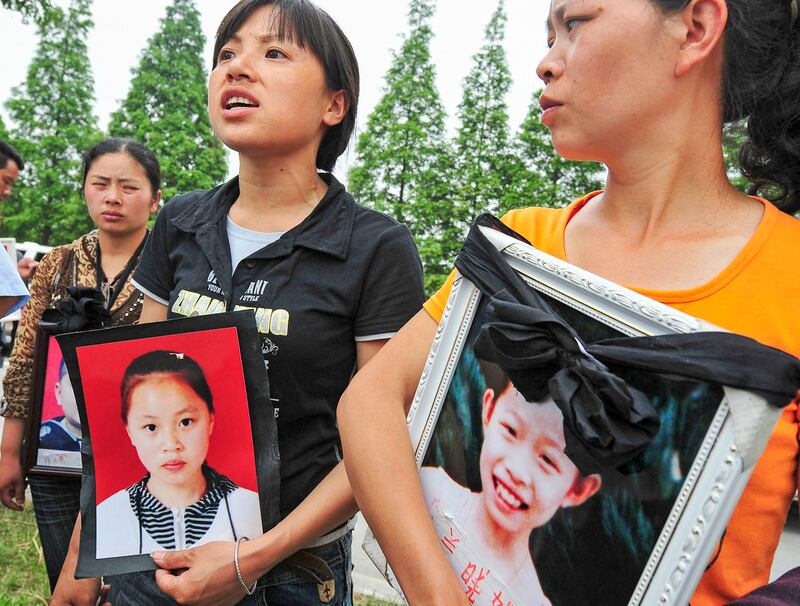
"A lot of the parents there were in a low mood and angry," Zhou Xingrong, a bereaved parent from Sichan's Dujiangyan city who has lodged more than 100 complaints with the central government over the loss of her son, told RFA.
"It's the 16th anniversary, and we only wanted to commemorate our children at the place where they were killed," she said. "They haven't allowed this in 16 years."
"We parents are extremely angry, because they've done nothing to pursue those responsible for the tofu buildings," Zhou said.
Corruption and harassment
The families of the children who died when their school buildings collapsed in the quake blame rampant official corruption for shoddy construction work, but say that a promised investigation into the causes of the children's deaths has never materialized.
They have also complained of repeated harassment at the hands of the authorities as they seek redress for the deaths of their children.
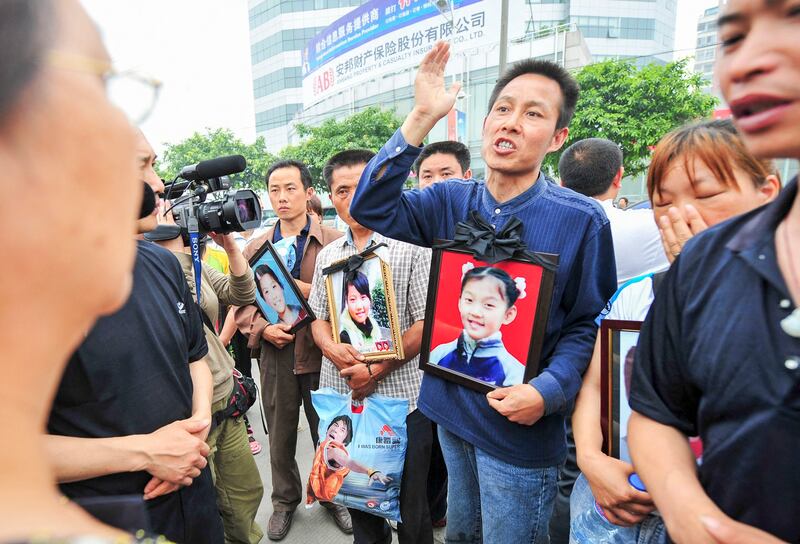
Sang Jun, whose son died in the Fuxin No. 2 Elementary School in Sichuan's Mianzhu city, said the government won't even give them a dedicated location at which to mourn.
"We don't have a place to mourn our children," Sang said, in a reference to calls to set up a dedicated cemetery.
He said the authorities -- who gave special dispensation to bereaved quake parents to have another child despite the one-child policy that was in effect at the time -- had also failed to deliver on promises to subsidize the upbringing of the second child to the age of 18.
‘Not giving up’
Bereaved parent Lu Biyu said she is getting older and her health is failing, yet "would feel terribly guilty towards my child if I didn't keep mourning."
"I can't imagine not commemorating my child, even though I'm physically and mentally exhausted," Lu said. "I will definitely keep going, year after year."
Zhou agreed.
"My kid died unjustly there, so I'm not giving up. I'm determined to stand up for my rights," she said, despite a failed petitioning trip to Beijing where she was forced to leave the city. "I haven't stopped."
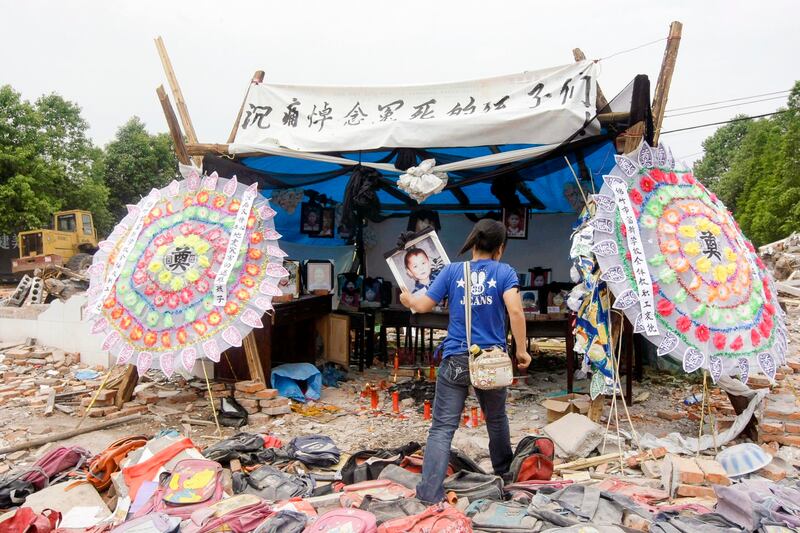
Li Dequan, a bereaved parent from Luoshui township who lost his 12-year-old daughter in the quake, has made repeated attempts to meet with local deputies to local branches of the People's Congress, to no avail.
"I didn't manage to meet with anyone," he said, adding that he couldn't give a longer interview because police were monitoring his phone calls and WeChat messages, and would haul him in with a summons if he spoke to the media.
Former chef Yang Yu, who was in Chengdu when the quake struck, recalls escorting a film crew from Radio Television Hong Kong into the worst-hit areas of Sichuan in the days that followed.
"The schools collapsed across the board, unlike other residential buildings," said Yang, who is currently in the United States. "Some residential buildings did collapse, but some just cracked, or tilted."
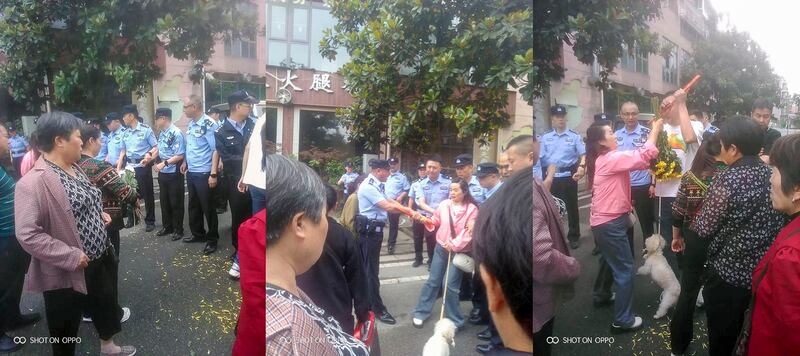
"But the school buildings were razed to the ground," said Yang, who later helped dissident writer Tan Zuoren and documentary film-maker Ai Xiaoming with their research into the deaths of schoolchildren.
He said local authorities had even refused to publish the names of the 5,335 children who are known to have died in local newspapers, despite repeated requests.
Learning nothing
Three years after the disaster, dissident artist Ai Weiwei made an audio recording featuring all of the names of the children known to have died.
U.S.-based Jin Ji was in a Chengdu primary school on the day of the quake, but said that despite feel-good comments from Chinese leaders at the time of the disaster, the ruling Chinese Communist Party appeared to have moved on from the disaster rather than learning from it.
"It's as if the whole thing is over," said Jin, who used a pseudonym for fear of reprisals. "Nobody is talking about improving the construction of school buildings to meet seismic standards because this happened."
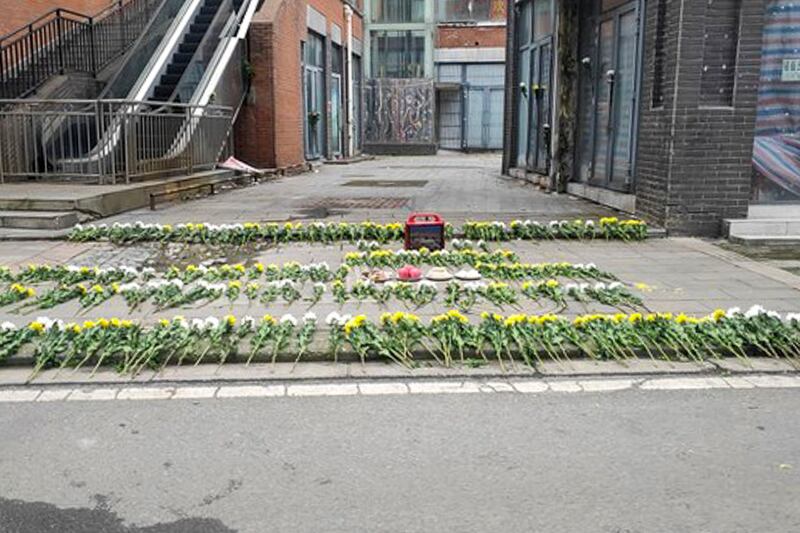
Xia Ming, professor of politics at New York's City University, also took a camera crew into the quake-hit area in May 2008, where they were followed by suspected government agents.
He traces the beginnings of China's current surveillance state to the year of the Beijing Olympics, which took place in the same year as the Sichuan earthquake.
"They normalized the monitoring and stability maintenance mechanisms set up for the Olympics," Xia said. "[Now] we have a surveillance state focused on stability. Eventually, the whole of China was put on an emergency footing."
Translated by Luisetta Mudie. Edited by Malcolm Foster.
